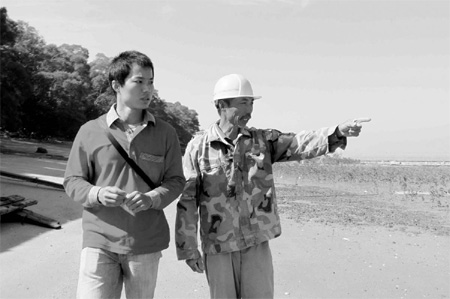Preventing paradise lost
Updated: 2010-12-21 07:30
By Peng Yining (China Daily)
|
|||||||||||
Seeds of hope
The central government in March this year introduced a law to regulate remote islands, stating that people who inhabitants need to register with local authorities and apply before carrying farming, fishing or planting.
Although the move is geared toward protecting the fragile environment of the country's islands, Lin is not in support.
"The government did nothing to protect my island. I don't have to report to anyone," he insisted.
Over the years, he has also resisted almost all offers of cooperation, including a 2.2-million-yuan offer from a Xiamen company that proposed developing Crocodile Island into a tourism attraction.
"They just want to make money. They don't care the island's future," added Lin.
The only help he has accepted is from China Mangrove Conservation Network. The NGO in 2008 drew up a protection plan that involved planting mangrove, a type of coastal tree, to conserve the shrinking beach line. The organization provided free seedlings and taught Lin how to plant.
 Lin Beishui (right) points out the shrinking coastline of Crocodile Island, one of many islets off the coast of Fujian province, to his son, Lin Dasheng. [Photo/China Daily] |
"Lin accepts us because we want the same thing: to protect Eyuyu Island," explained Liu Yi, 28, director of the China Mangrove Conservation Network. "He can live on the island alone, but it's hard for him to save the island by himself."
Without action to slow soil erosion, the island will disappear, warned the environment activist, whose group has planted more than 100,000 mangroves on its beaches.
"Crocodile Island is just a small piece of land, but for Lin's family and the lifeforms that live there, it's the whole world," added Liu. "Our world is also an island but it's too big for people to understand that we are losing it."
The islet used to be covered by mangroves, but people destroyed them for dredging and fishing, which means the sea can now directly sweep away the earth.
According to the network, 90 percent of mangroves in Xiamen have disappeared because of reclamation, coastal real estate development and pollution.
China has already reclaimed a total of 13,380 square kilometers of offshore land and plans to reclaim another 5,780 square kilometers over the next decade, according to a report by the China Institute for Marine Affairs of State Oceanic Administration.
"The (target) number is almost half the total area (already reclaimed)," said Fang Qinhua, a professor at Xiamen University's oceans policy and law center. "The total amount of reclamation has increased sharply and some of the projects have adversely affected the coastal environment."
China Mangrove Conservation Network plans to transform Lin's island into an environmental education site. By using the shrinking island as an example of the ongoing global ecology crisis, the group hopes more people will learn the importance of conservation.
"Everyone will be shocked when they hear that such a beautiful island is disappearing," said network director Liu. "The island will only be saved when more people participate (in protecting it), especially the (Xiamen) government."
Lin, who keeps seven dogs to guard the island and deter fishermen from catching crabs and destroying his seedlings, said he welcomes the idea of more visitors to Crocodile Island. He has even offered to make a swing for tourists.
"It's my island I will never give up on saving it," he said. "After I die, my ashes will be buried here."











